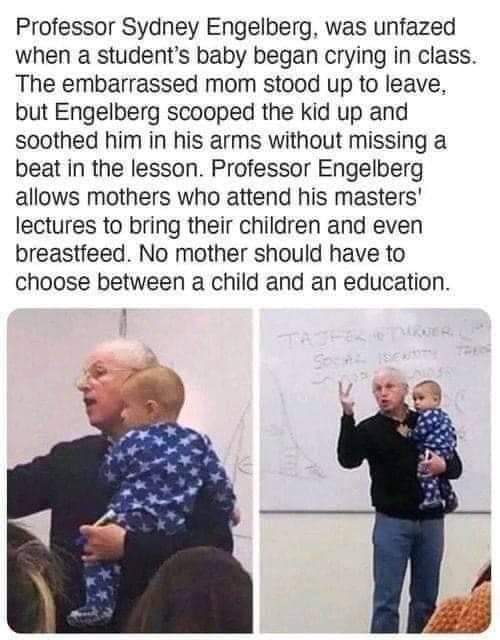No mother should have to choose.
Professor Sydney Engelberg stood in front of his classroom, passionately delivering a lecture when suddenly, a baby’s cries pierced the air. The sound came from a student who, overwhelmed with embarrassment, began to stand up to leave. But Professor Engelberg, unfazed, quickly stepped forward, scooped the child into his arms, and began to soothe him, all without missing a beat in his lesson.
In the past week, Jerusalem psychology professor Sydney Engelberg has gained Internet fame, fielded interview requests from all over the world and earned devotion from parents of infants everywhere, all because of a simple gesture: Holding a student’s fussy baby while continuing to teach class.
Engelberg, 67, became a viral sensation last week after a former student went onto an Israeli social media site and shared a photo of the professor in front of a white board mid-lecture, holding a baby in star-covered footie pajamas.

Engelberg’s daughter, Sarit Fishbaine, saw the photo and proudly shared it on her Facebook page with a message in Hebrew that ended, “My father is the best in the world.”
The professor, who teaches graduate courses in organizational behavior at Hebrew University and Ono Academic College, didn’t know who shot the photo, or even when it was taken.
This particular moment doesn’t stand out in his mind because it happens fairly often. Just last week, he said, another mother asked if she could bring her baby “who wasn’t feeling 100%,” and when the child became restless, Engelberg said he picked up the baby and walked around so everyone could continue learning. The student could continue to participate in a group exercise, and the rest of the class wouldn’t be negatively affected.
“I would say there is one or more babies in one or more classes every single week,” he said. That’s not to say he runs a nursery, but his students know that he will be understanding if the need arises.
The idea that a professor would be so understanding toward a young mother earned Engelberg kudos from parents everywhere.
The classroom watched in awe as the professor seamlessly integrated the moment into his lecture. He encouraged the mother to stay, assuring her that her child was welcome. For Professor Engelberg, it was clear: education and parenthood could coexist harmoniously.
Engelberg said Israeli society is very family-oriented and doesn’t just give lip service to the proverb that it takes a village to raise a child. Secondly, because of compulsory military service, Israeli students tend to begin school at an older age and are more likely to have young children.
“Just for that demographic reason, one has to be understanding.”
In his classes, he actively encourages mothers to bring their children along and even supports breastfeeding during lectures. His stance is simple yet powerful: no mother should have to choose between caring for her child and pursuing her education.
“You can’t simply talk about them, you also have to act on them, and one of the ways that I’m able to act on them at least in the academic setting is by relating to the mothers – relating to those students who are unable to find alternative childcare arrangements in a way which enables them to remain engaged, which shows respect for their situation.”
That day, as he rocked the baby gently, he demonstrated that compassion and understanding have a place in academia. His actions sent a profound message to all his students: that education should be inclusive and supportive of the diverse realities of life.
Moral of the Story: True education thrives in an environment of empathy and inclusivity. When we create spaces where individuals can embrace both their personal and professional lives, we empower everyone to succeed. It’s a reminder that kindness and understanding can transform the educational experience, allowing all voices to be heard and valued.
